Moate Cycles
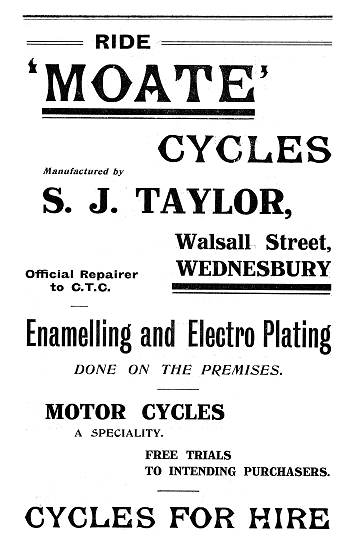 |
Wednesbury had at
least one cycle maker.
S. J. Taylor is listed in Peck's 1896 Trade
Directory of Birmingham. The address given is Apsley
Place, Pritchard Street, Wednesbury.
The advert opposite is from
Ryder's Annual, 1909.
|
|
The advert opposite is from
Ryder's Annual, 1911. |
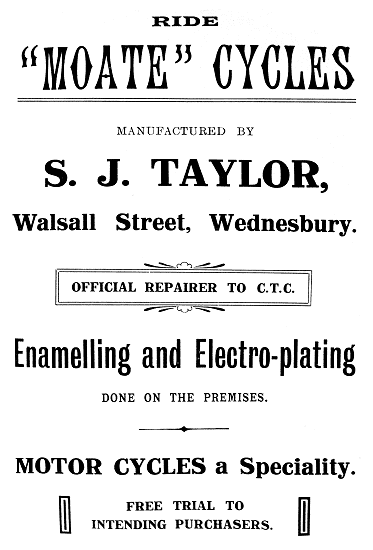 |
Moseley Cycles
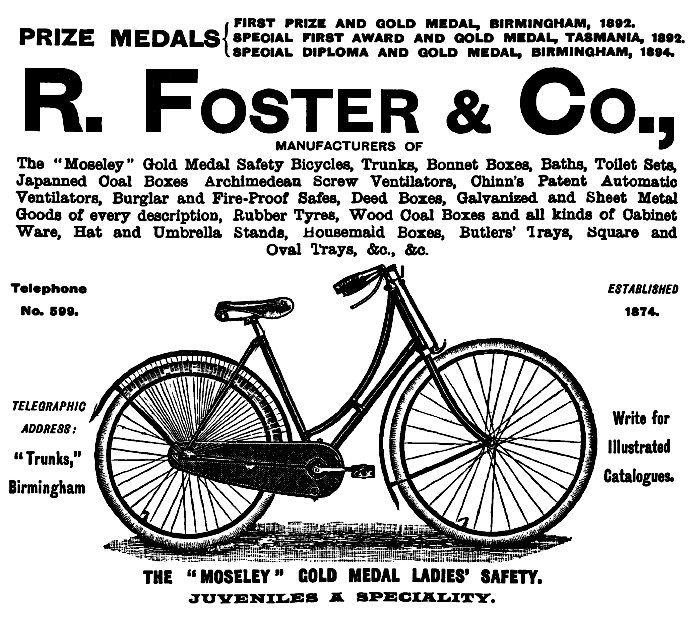
An advert from 1896.
Mount Cycles
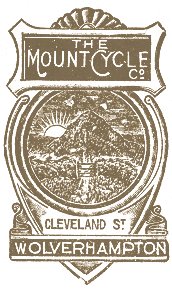 |
Harry Jones, a foreman frame builder at the Star Cycle
Company set himself up in business when the company closed
in about 1915. He started building cycles at works in Church
Lane under the name of Mount Cycles. By 1925 he had moved
to premises in Cleveland Street and built machines and
frames to special order for specialised cycle makers.
Mount Cycles stayed in
business for many years, and is listed in the 1951
Wolverhampton Red Book, but not in the 1956, or subsequent
editions. It seems that the business closed sometime between
1951 and 1956. |
New Hudson
The New Hudson Cycle Company was formed in Sheepcote Street,
Birmingham in 1890 by George Patterson. Hudson, Edmunds & Company had a
factory there producing brass tubes. One of their employees, Edward A.
Wilson, entered into partnership with George Patterson to manufacture
bicycles and some of their products were displayed as Hudson safety
bicycles at the 1891 Stanley Cycle Show.
In 1893 the cycles were displayed at the National Show and St
George's Works was built in a four-storey factory, near to the old
factory, to enable them to produce around 200 bicycles a week. The firm
then became the New Hudson Cycle Manufacturing Company Limited.
By 1907 the firm was producing a range of bicycles including the New
Hudson racer, after Mr. G. Flint, broke several speed records on his
machine. Other models included the 'Modele Royale' ladies cycle with
triplex gear, the 'Standard' with patent steering lock, the 'Semi-Racer'
for lightness and speed, the 'Ladies Popular' and the 'New Hudson J.O.G.' as used by Mr
G. A.Olley in his record breaking ride from Land's End to John o'Groats
in 3 days 20 hours 15 minutes.
During the First World War, one of George Patterson’s sons was killed
and the other lost a leg. He then decided to sell the business to H. J.
Bructon and in 1920 it became New Hudson Limited. The firm was acquired
by BSA cycles in the late 1920s and BSA continued to use the New Hudson
name until the business was acquired by Raleigh in the late 1950s.

New Tower
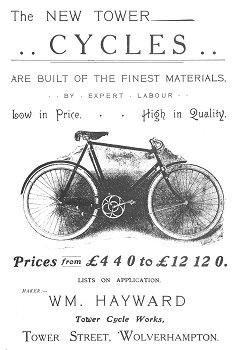
Nimbus
| From the Illustrated Towns of
England Business Review of Wolverhampton, 1897.
S. lllidge and Son, General
Brassfounders. Manufacturers of every description of Locks,
and Makers of the "Nimbus" Cycles, Alexandra Foundry, Great
Brickkiln Street, and Alexandra Street. Telegraphic Address:
"Illidge, Wolverhampton." Telephone No. 7214.
The extensive business carried on by
Messrs. S. Illidge and Son, as General Brassfounders, Lock
and Cycle manufacturers, etc., is clearly entitled to
prominent notice in this review, It was founded as long ago
as 1826, and has had a career of prosperity clearly
indicative of a management of unusual strength and ability.
This firm are general brassfounders, and among their
numerous manufactures in this line may be mentioned: every
description of cabinet, brass and iron pad, rim, mortise.
and dead locks; combination, lever, and Bramah night
latches; water closet, pulpit, shutter, pew, ships and other
latches; flush and barrel bolts; sun blind furniture; rack,
pulleys, sash and casement fasteners; brass butt hinges,
cabin hooks, lifting and cash box handles, stable fittings,
etc. They are also patentees of fanlight openers, indicating
fasteners, the "Eclipse" sash fasteners, etc.
All these
productions are in large demand, and are renowned for best
quality of material, great utility and superior finish.
Messrs. Illidge are, we believe, the only firm in the
district who mix their own metals on the premises, hence
they are most advantageously situated to ensure both uniform
high quality and economy of production. Their works cover a
considerable area of ground at the corner of Great Brickkiln
and Alexandra Streets; they are of substantial construction,
conveniently arranged throughout and equipped with all the
requisite machinery and appliances of modern type.
Last year
the firm embarked in the cycle manufacturing trade, building
new works of a commodious character, and equipping the same
with special improved machinery for carrying on all
operations successfully, including the manufacture of
component parts, plating, enamelling, etc. The name given to
their cycles is the "Nimbus," and the large demand which
already exists for these machines proves them to be equa1 in
design, speed, light running, and high-grade quality to any
in the market.
This firm manufactures ladies' and gentlemen's
safeties, juvenile safeties, racers, roadsters, tricycles,
and tandems, which are fitted with the best makes of tyres,
gear cases, and saddles to order. The "Nimbus" is a
thoroughly modern "mount" at a reasonable price, and is sure
to gain in popularity as it becomes better known among
cyclists of both sexes. Messrs. Illidge employ from 150 to
200 hands in the different departments of their business,
and are admirably placed to execute all orders in the
promptest style. For a business so excellently managed in
every respect, we can safely predict continued success.
|
|
Olympic Bicycles
|
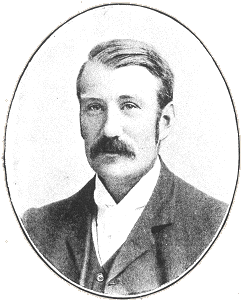
Frank Heynes Parkyn. |
Frank Heynes Parkyn, the son of Robert Buckingham Parkyn,
a draper, and his wife Mary Ann Heynes, was born in Truro in
about 1859.
On 22nd August, 1889 he married Winifred Ellah Stallybrass
at the
Stoneway Congregational Chapel, Bridgnorth. Her father was
the Rev. H. M. Stallybrass, of Bridgnorth, formerly the
pastor of Truro Congregational Church.They are listed in
the 1891 census as living at 339 New Hampton Road,
Wolverhampton. The entry is as follows:
Frank Heynes Parkyn, age 32, born in Truro, cycle
manufacturer and employer.
Winifred Ella Parkyn, wife, age 23, born in Saltaire.
Dorothy Heynes Parkyn,
daughter, age 7 months, born in Wolverhampton.
Harold Stallybrass, age 15, born in Wirksworth,
Derbyshire, an apprentice. Also two servants. |
| Frank and Winifred had four children, Dorothy Heynes
Parkyn, who died young, Gerald Frank Parkyn, born on 30th
April, 1892, Dorothy H. Parkyn, born in 1901, and Herbert
Martyn Parkyn, born in 1910. Gerald Frank Parkyn emigrated
to Canada in 1912, and after serving in the Canadian
Expeditionary Force in World War One, married Isabel
Winnifred Tessie Grant, and they had three children.
Frank Parkyn started
producing Olympic bicycles in Green Lane in the early 1880s
and moved the business to Granville Street in 1896.
Mr. Parkyn introduced the latest machinery and manufacturing
techniques at the works and became the Liberal member of the
Town Council for St. George's Ward in 1897. At this time
the family lived at 10
Rectory Terrace, Wolverhampton. In 1901 they were living at
342 Wolverhampton Road, Wolverhampton, and in 1911 they were
living at 337 Newhampton Road East, Wolverhampton.
For several years Frank Parkyn
was a partner in
Daniel Smith
and Company,
Engineers, Machinists, and Tool Makers, at Castle Works, Raglan
Street, Wolverhampton. The partnership was dissolved in
1884. He also became Vice President of the Motor and Cycle
Trades Association, a Justice of the Peace, and Chairman of
Walters (Wolverhampton) Limited, maker of cycle gear cases
and chain covers, based in Melbourne Street, Wolverhampton. |
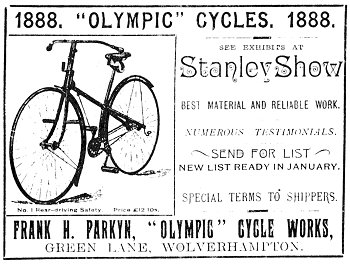 |
An advert for the 'Olympic'
No. 1 bicycle which sold for £12.10s. |
| The 'Olympic' No. 1 had curved semi-hollow front,
and hollow back forks, elliptical handle grips with 27" bent
back, and hollow, adjustable, and detachable handlebars. The
frame was made of 1.75", 15s.w.g. weldless steel tube. Both
wheels had mudguards and the machine weighed 43lbs. |
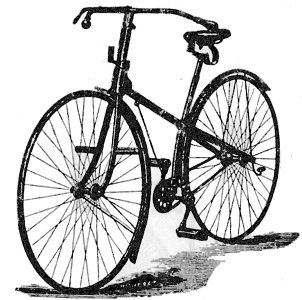
|
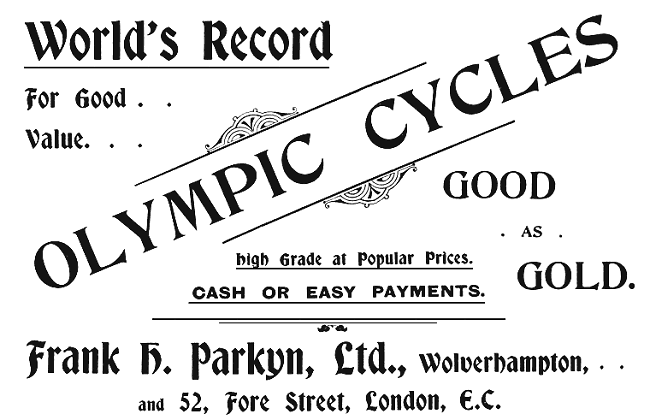
An advert from 1899.
|
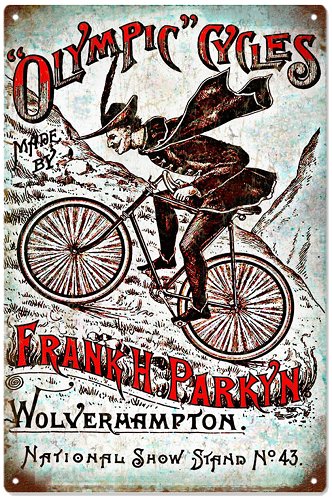
Courtesy of John Parkyn. |
The following is a short
description from "Bicycles & Tricycles of the Year 1889"
by Harry Hewitt Griffin:
The Olympic Diamond Dwarf Safety Roadster. Frank
Parkyn, Granville Street, Wolverhampton.
A skeleton frame machine composed of strong tubes. We
believe the central stay has been added since we
inspected it; if so, it will make an excellent frame.
Chain adjustment is made by a sliding carriage, taking
the crank axle, on the end of the lower rear forks. The
cranks are detachable, and the forks are curved.
There
is a plunger lever brake to the pilot wheel; and with
all the usual etceteras, the list price (both wheels
30in., balls all parts), £15.10s.
There are also some
lower-priced machines, with single frames. |
|
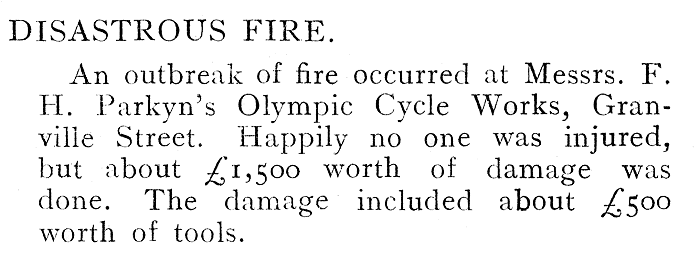
The report of a serious fire at the
factory, from the Wolverhampton Journal. The fire broke out on
27th July, 1908.
After the First World War the business became the Olympic Cycle
and Motor Company Limited. Olympic motorcycles were produced
from 1902 to 1905 and from 1919 to 1923, when the business
closed, due to falling sales. |
| In 1931 Frank Heynes Parkyn became liquidator for Walters
(Wolverhampton) Limited:
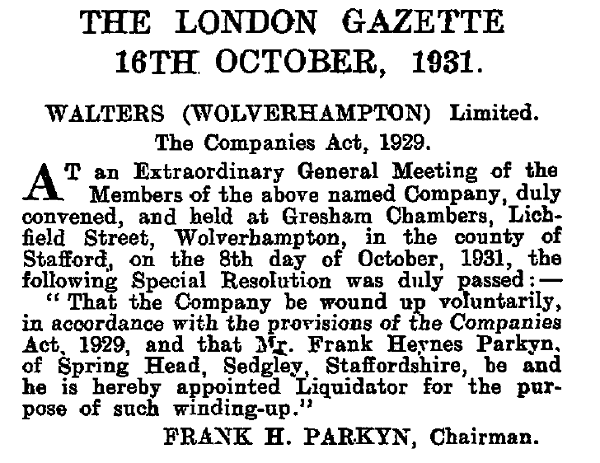
Frank Heynes Parkyn died in 1939. At the
time he lived at Springhead, Sedgley.
I would like to thank John Parkyn for his help
with this section. |
Onward Bicycles
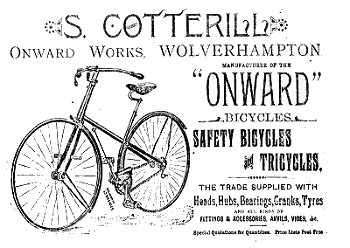 |
Onward was one of the many component suppliers to
the bicycle industry. The bicycle on this 1886 advert is printed
from the same block as was used in the 1886 advert for the
'Wulfruna' Safety No. 4 bicycle, and so may have in fact been made
by Wulfruna Cycles. |
| The photograph on the right was kindly sent by Emma
Matthewson and shows her Great Grandfather Samuel Cotterill.
It is believed that this is the Samuel Cotterill who founded
'Onward Bicycles'. He was born on 17th April 1861 at Townwell Fold,
Wolverhampton and his Marriage certificate, dated 30th March, 1884
states that his profession is a bicycle maker.
If anyone has any further information about the company please
contact me, I will be
delighted to hear from you. |
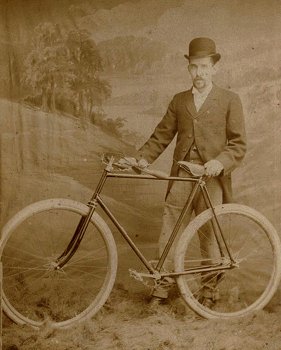 |
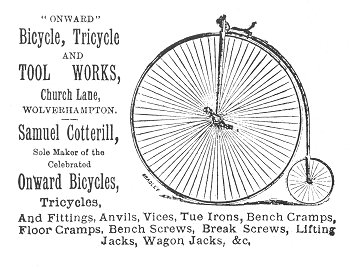
The Parkdale
Cycle and Machine Tool Company
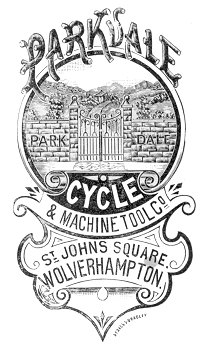 |
From an 1897 trade directory:
This firm manufacture the celebrated Parkdale cycles, and their
productions hold an eminent position not only in the home
markets, but also abroad. The large works are situated in St
John's Square; the modern plant and machinery being on the most
up-to-date principles, and the productive bowers of the concern
are very large. The cycles manufactured by the Parkdale Cycle
and Machine Tool Co. are of the highest grade, their make
displaying an embodiment of all the latest improvements applied
in the best possible manner. Their ladies' machines are of the
latest design, and are very popular, being made with a nice
dress clearance, which is very acceptable to the rider. Their
No.105 is a magnificent mount, and is the result of much time
and study given during the recess. The works have been greatly
extended to meet increased demands, and the company are now
enabled to give the most prompt delivery of orders. |
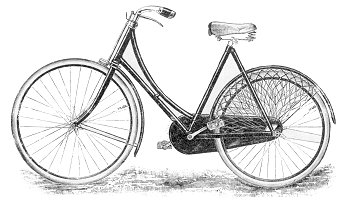
| Agents would do well to communicate with this firm,
whose goods are of the most reliable order. The Parkdale
cycle fittings, saddles, gear cases, valises, etc., all
display the same amount of excellent workmanship, best
quality material, and elegant design, and bear silent
testimony to the thought, care, and practical skill brought
to bear in their manufacture. By sheer enterprise and
ability this firm has attained their present high position
in the cycle world, and are deserving of the highest
congratulation on the fact that not only have they been able
to hold their own in the go-ahead race for place, but they
have made considerable strides, which can only be
accomplished by the utmost energy and tact. |
Peerless
The following is a short
description of a Peerless tricycle from "Bicycles & Tricycles of the
Year 1889" by Harry Hewitt Griffin:
The Peerless Direct Steering Roadster. S. Goodby &
Son, Petit Street, Wolverhampton.
Those who cannot afford a long price, and are content with a
strong-built machine, will find in the Peerless a good and remarkably
cheap mount. It is built on what may be described as regulation lines
for a direct steerer, with dropped 'V' frame and the very necessary four
bearings to the axle. The front forks have a nice curve, and the brake
is a direct plunger. The standard size of the wheels is 36in. and 28in.,
and, except pedals, ball bearings are put to all parts. The price is
only £14. There is a capital Juvenile Peerless, for youths or girls in
their teens, with 36in. and 18in. wheels, at £5; it is enamelled and
part plated, with adjustable parts.
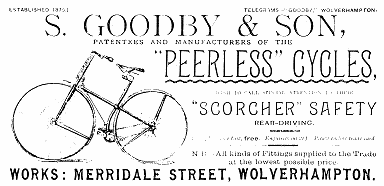
Courtesy of Jim Boulton.
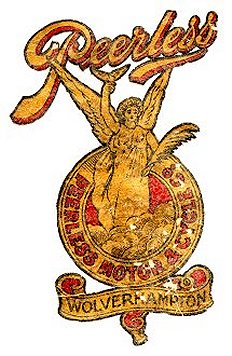 |
|
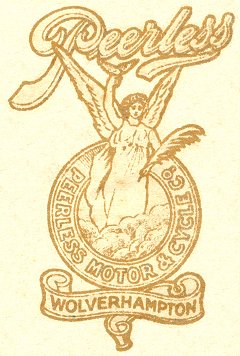 |
|
Courtesy of Jim Boulton. |
|
Peter Pan Bicycles
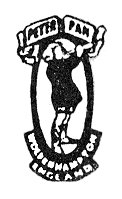 |
Peter Pan was founded after World War 1 in Stewart
Street. It became a well known manufacturer of juvenile bicycles.
Sales were good and the company moved into part of the old A.J.S.
works at Graiseley Hill. After World War 2 production moved to works
in Temple Street and for a time toy cycles and pushchairs were added
to the product range. John Whittingham who had been cycle production
manager at Sunbeam was the company's managing director. In the late
1940s they moved to works on the corner of Salop Street and St.
Marks Road. The company closed in the mid 1950s. |
Price Cycles
George Price, a well known
lock and safe maker in Cleveland Street produced a range of bicycles.
The most expensive model was the 'London'. The cheaper model 'Liverpool'
sold for £9.10s.
The following two descriptions are
from "Bicycles of the Year 1877" by Harry Hewitt Griffin:
The London (Price's). George Price, Cleveland Larger
Works, Wolverhampton. These are of superior construction to the
others by the same firm, and have steel rims, red rubber tyres (wired on
as well as cemented), steel spokes, gun metal hubs, roller bearings,
Sheffield bone, and ditto head, neat lubricators, and well made, but
even with this high priced machine, oil can and spanner are charged for,
things that are given with the commonest and lowest priced machines
made. The system is unique, and not to be admired. It is to be regretted
that the maker should have chosen for his machine a name which has
already been adopted by a London firm. The
Wolverhampton. George Price, Cleveland Lodge, and Lock Works,
Wolverhampton.
A cheaper class than "The London", having an iron backbone, and 'V'
rims, gun metal hubs keyed on the axle, bearings (cones) screwed to the
fork, red or grey rubber tyres, the spring bows out in front of the fork
head, which is either socket or centres, the rear wheel is adjustable,
and there are usual details. A remarkable fact is that spanner and oil
can are charged extra. A lower class machine, the Liverpool, is made at
£2.10s. less.
Raven Cycles
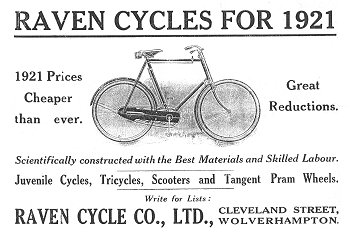
An advert from 1921. Courtesy of Jim Boulton.
Regal Cycles
W. Shepherd built Regal bicycles at his premises in Sedgley Street. They were
well built machines with hollow steel or Firbanks wooden rims. George
Whale, an ex-Coventry cycle maker was in charge of production. Mr.
Shepherd started as a coal merchant, then turned to brick making in the
1860s, with works in the Dudley Road and Green Lane area. He also became
a builder and by 1897 had erected over 500 houses. Mr. Shepherd also
served as a local councillor.
| From the Illustrated Towns of
England Business Review of Wolverhampton, 1897.
W. Shepherd & Co., "Regal" Cycle Works,
Sedgeley Street.
The manufacture of cycles is carried on
very extensively in Wolverhampton, and the town has a high
reputation both at home and abroad for the high grade
quality of its productions. Among the numerous firms engaged
in this flourishing branch of industry, we must mention
Messrs. W. Shepherd & Co., makers of the "Regal" machines,
whose works are situated in Sedgley Street, off Dudley Road.
Though of but recent origin, this business promises to
assume a very successful career.
Being assisted by a skilled
staff of hands, under the personal direction and supervision
of Mr. George Wale, a gentleman of large experience gained
with celebrated makers of Coventry. Messrs. Shepherd & Co.
have no fear of being able to place upon the market machines
that will occupy a very front rank for beauty of design and
finish, speed and light running, combined with great
durability. The special makes are The "Regal" Model A,
Lady's Safety; the "Regal" Model B, Lady's Safety; the
"Regal" Model C, Light Roadster; the "Regal" Model D, Full
Roadster; and the "Regal" Model E, Full Roadster. These are
fitted with joint-less hollow rims or Fairbank's wood rims,
and with the most celebrated makes of tyres, gear cases,
etc., as desired.
Every care is taken to ensure that none,
but the most perfectly constructed machines leave the
premises, while as regards price it will be found on
reference to the firm's handsome catalogue that no better
machines are placed on the market at more advantageous
terms. With the excellent manufacturing facilities at
command, no difficulty is experienced in meeting all demands
promptly. Knowing the resources and enterprising spirit of
this firm, we can safely predict a substantial and
gratifying measure of success for the coming season.
|
|
Robinson Cycles
In 1877 J. & A. Robinson were building bicycles at their
premises in Waterloo Road. The machines were made to order using the
'Robin' and 'Wolverhampton Challenge' names. The cycles had both ball
and roller bearings, came complete with tools, a tool bag and oil can,
and were well priced at between £8 and £9. A racing machine based on the
Grout Tension wheel was also produced.
The following description is from
"Bicycles of the Year 1877" by Harry Hewitt Griffin:
The Robin, or Wolverhampton Challenge. J. and A.
Robinson, 6, Waterloo Road, Wolverhampton.
These are made of varied types and forms, in fact, "to order." There
seems to be no fixed class, the Stanley, Socket, Centres, and all being
brought into play as the guiding power; Spider wheels, spokes lock
nutted into solid or gun metal hubs, hollow backbone, good tyres. The
makers are now fitting either ball or roller bearings without extra
cost. The shape of the spring is regulated by the make of steering gear
and ends with roller. The trailing wheel runs on cones. All extras, such
as trouser guard, brake, satchel to saddle, etc., are given free. The
firm also makes a neat looking racer, with better materials and
bearings, similar to those on Grout's Tension in the early part of 1875.
The bearings are plain, but part is cut away, so that the actual
friction is reduced to two edges, running easily.
|



